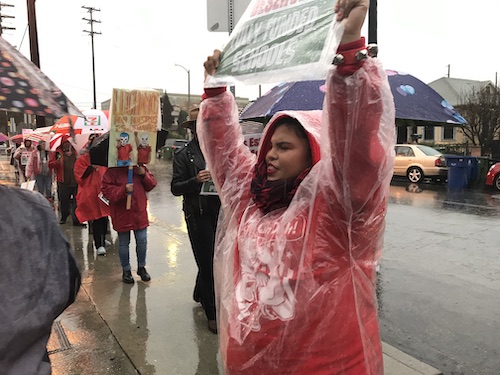Tens of Thousands of L.A. Teachers Cut Class to Strike
Some 30,000 striking teachers braved a downpour to tell school district officials about what needs to change before they'll return to class. Sylvia Muñoz, a fifth-grade substitute teacher at Gates Street Elementary School in Los Angeles, holds up a sign as part of the Jan. 14 teachers' strike in downtown L.A. (Bainbridge Scott)
Sylvia Muñoz, a fifth-grade substitute teacher at Gates Street Elementary School in Los Angeles, holds up a sign as part of the Jan. 14 teachers' strike in downtown L.A. (Bainbridge Scott)
On an average day in Los Angeles, a mere hint of drizzle can throw the whole city completely out of whack, to put it mildly. Not so on Monday, when even heavy showers couldn’t stop some 30,000 Los Angeles Unified School District (LAUSD) public-school instructors from cutting class and taking to the streets in the first teachers’ strike the city has seen in 30 years.
The L.A. strike is the latest in a series of collective actions organized over the last 11 months by educators around the country, which thus far have included statewide teachers’ strikes in West Virginia, Oklahoma and Arizona, as well as walkouts in Colorado, Washington, Kentucky and North Carolina. Last summer, 98 percent of LAUSD members were spurred to vote in favor of striking after failing to reach agreement with district officials about issues such as inadequate pay, overflowing classrooms and a glaring lack of full-time nurses and librarians and other key staffers in L.A.’s public schools.
More to the point, as one striking member of the LAUSD put it in a Huffington Post piece, “We’re walking out because we feel like we’re part of a rigged game set up to undermine public education.” This take on the state of the nation’s educational system may be bleak, but it’s apparently not rare—and projections are looking dire for teachers, their students and other members of the extended public-school community. In December, the Wall Street Journal reported that “[t]eachers and other public education employees, such as community college faculty, school psychologists and janitors, are quitting their jobs at the fastest rate on record,” according to government data.
Monday’s marchers converged at Grand Park in downtown Los Angeles before making their way to a triangular high-rise building at Third Street and Beaudry Avenue where the LAUSD’s administrative offices are located. Many strikers managed to keep the mood light despite the heavy cloud cover and the gravity of the stakes in play. Take, for example, this scene from downtown Los Angeles, in which a group of LAUSD members chanted about “striking in the rain” in front of the school district’s headquarters:
That footage was shot by L.A.-based music teacher Bainbridge Scott, who told Truthdig that she is responsible for more than 1,200 students at five different LAUSD schools—“some years six or seven schools.” She teaches nine classes per day, and her class sizes run well over their designated limits.
What’s more, Scott faces in her daily routine a host of challenges that have become all too familiar among her colleagues: “Not enough supplies [or] instruments, copies are limited but no materials provided, auditoriums with no heat or air conditioning,” she said.
To that list she added the widespread and detrimental overemphasis on standardized testing on the part of district leaders and the glaring encroachment of for-profit charter schools into her teaching space, literally and figuratively. “I just lost my music room to a charter school at Albion Elementary School,” she said, describing an uneasy cohabitation scheme, which she said demoralizes students by segregating them into different schools operating on the same campus.
Plans were underway Monday afternoon for the strike to continue Tuesday with pickets at schools around the city and a rally set for 10:30 a.m. at the California Charter Schools Association’s L.A. headquarters on First Street. At the close of the first day of the LAUSD strike, Scott said teachers were “immensely enthusiastic about this historic day,” remarking how “tons of parents dropped off donuts but not their kids,” allowing their children to stay home as a show of solidarity.
Addressing her district leaders, Scott kept her message simple and optimized for all learning levels. “Game on,” she said.
Your support matters…
Independent journalism is under threat and overshadowed by heavily funded mainstream media.
You can help level the playing field. Become a member.
Your tax-deductible contribution keeps us digging beneath the headlines to give you thought-provoking, investigative reporting and analysis that unearths what's really happening- without compromise.
Give today to support our courageous, independent journalists.






You need to be a supporter to comment.
There are currently no responses to this article.
Be the first to respond.